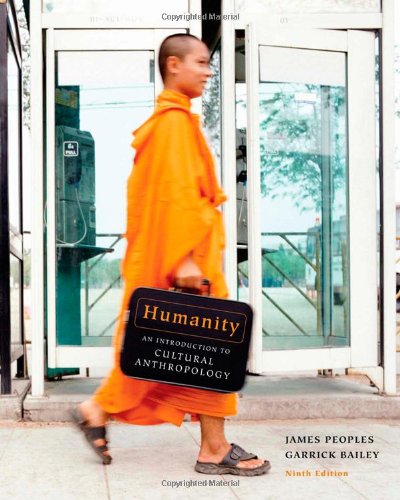Humanity: An Introduction to Cultural Anthropology
Using engaging stories and clear writing, CENGAGE ADVANTAGE BOOKS: HUMANITY: AN INTRODUCTION TO CULTURAL ANTHROPOLOGY, Ninth Edition, introduces cultural anthropology within a solid framework centered on globalization and culture change. Peoples and Bailey focus on the social and cultural consequences of globalization, emphasizing culture change and world problems. The book’s engaging narrative provides new ways
Using engaging stories and clear writing, CENGAGE ADVANTAGE BOOKS: HUMANITY: AN INTRODUCTION TO CULTURAL ANTHROPOLOGY, Ninth Edition, introduces cultural anthropology within a solid framework centered on globalization and culture change. Peoples and Bailey focus on the social and cultural consequences of globalization, emphasizing culture change and world problems. The book’s engaging narrative provides new ways of looking at many of the challenges facing the world in this century. As you explore more contemporary issues, including recent debates on gay marriage, cultural and economic globalization, population growth, hunger, and the survival of indigenous cultures, you will gain a better understanding of the cultural information you need to successfully navigate in today’s global economy. The authors emphasize the diversity of humanity and reveal why an appreciation and tolerance of cultural differences is critical in the modern world.
Product Features
- The text emphasizes contemporary issues such as religious fundamentalism, transnational marriage, the World Bank, the spread of disease, aging, and genocide as a response to ethnic conflict.
- This edition focuses on topics that affect your students today, such as gay marriage, religious fundamentalism, ethnic and religious differences in Iraq, changing norms and practices on marriage and kinship, increasing national and global inequalities, and the cultural construction of race.
- The authors integrate globalization into the narrative of almost all chapters while using boxed “Globalization” features in every chapter to delve into more detail and highlight various kinds of globalization, such as the spread of cultural ideas, language, market exchanges, inequality, art, and migration.
- This valued text provides the latest statistical data on the distribution of annual income and wealth in North America. The authors also discuss the possible relationship between globalization and terrorism.







Comments